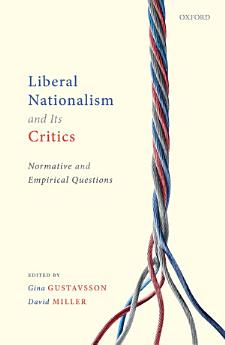Liberal Nationalism and Its Critics: Normative and Empirical Questions
Gina Gustavsson · David Miller
Dec 2019 · Oxford University Press
Ebook
336
Pages
family_home
Eligible
info
reportRatings and reviews aren’t verified Learn More
About this ebook
The thesis of liberal nationalism is that national identities can serve as a source of unity in culturally diverse liberal societies, thereby lending support to democracy and social justice. The chapters in this book examine that thesis from both normative and empirical perspectives, in the latter case using survey data or psychological experiments from the U.S., Canada, the Netherlands, Denmark, France, and the UK. They explore how people understand what it means to belong to their nation, and show that different aspects of national attachment - national identity, national pride, and national chauvinism - have contrasting effects on support for redistribution and on attitudes towards immigrants. The psychological mechanisms that may explain why people's identity matters for their willingness to extend support to others are examined in depth. Equally important is how the potential recipients of such support are perceived. 'Ethnic' and 'civic' conceptions of national identity are often contrasted, but the empirical basis for such a distinction is shown to be weak. In their place, a cultural conception of national identity is explored, and defended against the charge that it is 'essentialist' and therefore exclusive of minorities. Particular attention is given to the role that religion can legitimately play within such identities. Finally the book examines the challenges involved in integrating immigrants, dual nationals, and other minorities into the national community. It shows that although these groups mostly share the liberal values of the majority, their full inclusion depends on whether they are seen as committed and trustworthy members of the national 'we'.
About the author
Gina Gustavsson is an Associate Professor at the Department of Government, Uppsala University. Her work spans political theory and political psychology, and has been published in Ethnicities, Ethnic and Racial Studies, Political Studies, The European Political Science Review, The Review of Politics, and The Cambridge Companion to Isaiah Berlin. She is also the author of a forthcoming book on romantic liberalism. Half-Swedish and half-Estonian, she has always had a keen interest in national identity and immigration. David Miller is Professor of Political Theory at Nuffield College, Oxford and a Visiting Professor of Law and Philosophy at Queen's University in Kingston, Ontario. He has been a Fellow of the British Academy since 2002. He has written widely on issues of national identity, citizenship, territory, and immigration, attempting throughout to build bridges between political philosophy and the social sciences. His next book will defend the idea of self-determination against its many critics.
Rate this ebook
Tell us what you think.
Reading information
Smartphones and tablets
Install the Google Play Books app for Android and iPad/iPhone. It syncs automatically with your account and allows you to read online or offline wherever you are.
Laptops and computers
You can listen to audiobooks purchased on Google Play using your computer's web browser.
eReaders and other devices
To read on e-ink devices like Kobo eReaders, you'll need to download a file and transfer it to your device. Follow the detailed Help Center instructions to transfer the files to supported eReaders.





